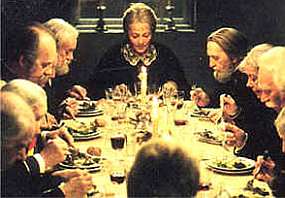(Warning: This post relies on many of the talking points in a previous post on the economy, "Politics, Economics, and the American Church." It may help to read that post first.)
I'm a dedicated reader of The Wall Street Journal. It's been the newspaper of record for me for about six years now, about the only newspaper that's both written for thinking adults AND not given to populating its staff with people burdened with agendas (*cough* Gray Lady *cough*).
But lately, the economic reporting at the WSJ resembles a hundred people sticking their wet fingers in the wind, each with a unique perspective on its ultimate direction. In the aftermath of the holiday buying orgy, that's ominous.
Long-time readers know that I discuss economic issues here at Cerulean Sanctum regularly. And one of my regular types of posts is my warning that the Church in America is woefully prepared for an economic meltdown. I remember 1999-2004 very well, but it seems that few others do. That recession was only a warning shot across the bow. But just as 9/11 did nothing to swell the ranks of our church rolls, we American Christians appear to have learned nada from that last recession.
After the trouncing the Republicans received just months ago, leading conservatives scratched and scratched their heads, blaming the defeat on everything except the economy. In fact, they thought their trump card was the strength of the economy. Yet I noted that in close races Democrats who eked out wins over Republicans in states that went to Bush universally ran as economic isolationists.  People voted for politicians they thought could protect their jobs, keep our trade deficit in check, and who understood that all this talk of free trade is little more than hot air at the expense of the guy just trying to keep his head above water.
People voted for politicians they thought could protect their jobs, keep our trade deficit in check, and who understood that all this talk of free trade is little more than hot air at the expense of the guy just trying to keep his head above water.
If I was wrong on that assessment back in mid-November, Christmas buying would tell.
Well, I've been noting the retail misery index in recent weeks, and as I expected, retailers are calling Christmas 2006 a bust. Yes, online retailers did better than in previous years (I'll get into that in a second), and so did luxury retailers. Yet for just about everyone else, Santa brought a lump of coal. Discounters saw their traditional base grow even cheaper, while mid-level department stores are already claiming the St. Valentine Day Massacre got moved up to St. Nicholas Day.
As for the luxury retailers, those folks with salaries in the top one percent have enjoyed close to a 20 percent increase in earnings since 2004. Given that happy days are here again for the financial elite, should we be surprised they're snapping up the latest special-edition Swarovski chandeliers for their yachts?
But for the rest of us 99 percent, we're slumming at around a three percent rate of salary growth in the face of 50 percent increases in energy prices in some markets, not to mention still-atmospheric gas prices. Did anyone else notice that prices for petroleum-based plastic items this Christmas were up 15 to 30 percent?
Which explains to me why online retailers finally did well this year–better to shop online than blow a ton on gas money driving around shopping. But even that doesn't explain it all.
I've been shopping online since 1994. I suspect that puts me in that top one percent of online shoppers. This Christmas, I purchased almost nothing online. Why? The prices were worse than brick and mortar stores. In all my years of online shopping, I can't recall that being the case. Shipping prices were up (obviously), but so were online retail prices in general. In years past, the big guns like Amazon and Buy.com killed the B&Ms in price. Not this year. In fact, this year the little niche players online had it all over the big guys, yet it was the big guys claiming 2006 filled their coffers.
So yes, the gas situation drove some of that. I also think that this may have been the year when the reticent Internet shopper loss his reticence. But as for us, three Christmases ago our front porch looked like an Amazon loading dock. This year, I bought nothing from Amazon at all.
In fact, in our extended family, both sides cut back on spending. Three years ago, my son alone got $250 worth of gifts. This year, I spent less than that on the sum total of our gift giving—for the eighteen people on our list. And one side of our family is already asking to cut back even more for next year.
Like I said in this post, our economy is not in good shape and no one seems to get it. Or at least they didn't before the day after Christmas.
Economists raved about the fabulous growth we had in 2006, though the actual percentage of growth has been repeatedly revised downward from 2.8 percent to 2.0 over the course of the year. A couple years ago, the same sources deemed Japan's 1.2 percent growth "miserable," yet here we are with our 2.0 percent growth in this astonishing period of blissful wealth. Last time I checked though, wealthy people didn't proclaim, "Hey, we need to spend even less money on Christmas."
Still, the economic news continued its wonderfulness all through December. However, the day after Christmas, the WSJ, the loudest of the wonderfulness trumpeters the last two years (even as its business pages told of company after company laying off employees, and its biz reporters wondered at the dearth of IPOs since 2004), announced that major economists predict another recession—soon.
Wow. A recession. From nowhere!
Six years ago, the majority of families we knew were single-income. Now, virtually none of them are. Yet if you ask these now-double-incomers if they're better off financially, you'll get two sets of bared teeth and a collective growl.
What continues to bug me is that we Christians aren't doing anything to prepare for the economic bottom falling out of America. From what the car rags say, Ford and GM (who were smarting for certain last December even with their employee pricing ruse) sold a grand total of three cars between the two companies this December. And China's set to introduce its first car line in America. If China starts dumping cheap cars here, you can bet that it won't only kick Ford and GM in the shins, it will force every car company in the world to ramp up building plants in China in order to compete. That means they won't be building more here. Few of us understand how much of our shaky economy depends on car manufacturers. The Church sure doesn't.
The sum total of all the millions of sermons preached in America in 2006 probably didn't include a half dozen talking about how to prepare the Church and its people for dark economic days. We've got virtually nothing in place to help folks find work. We don't fight for economic justice for the poor. So when its the middle class asking, "Buddy, can you spare a dime?" who's going to fight for us?
Where are the Christian leaders out there who can talk on this issue of economics in America? Who works with big corporations to bring godly justice for overworked, underpaid people? Who's calling companies on the carpet for paying failed CEOs of large multinationals golden parachutes of a quarter billion dollars or more? Money doesn't grow on trees, so someone lost money out of his pocket so that some corporate failure could gild his lillies while he waits for the next board of suckers to come around. How much more are you paying in medical expenses this year while the CEO of United Healthcare walks off with a billion dollars?
I keep hoping that each year's going to be the one when we smarten up. I'm beginning to see that the best we Christians seem to be able to do on this issue is react—and too late at that.
What is it going to take for us to get wise?

 Here at Cerulean Sanctum, we talk little about politics and much about economic justice issues. Today, we'll see how those two items intersected in the election last week and how we American Christians must wake up to a brutal reality.
Here at Cerulean Sanctum, we talk little about politics and much about economic justice issues. Today, we'll see how those two items intersected in the election last week and how we American Christians must wake up to a brutal reality. but entire meals in which the sharing of the bread and wine was the high mark.
but entire meals in which the sharing of the bread and wine was the high mark.